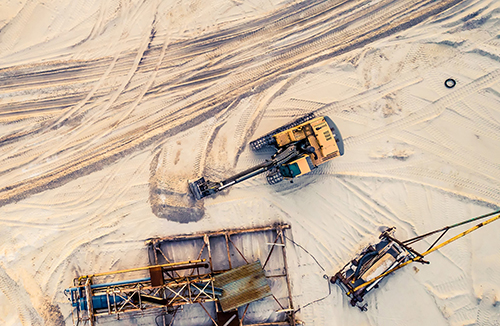Resources / Featured Topics
Unleashing the Future of Mining: Embracing Digital Transformation and Overcoming Connectivity Challenges for Tomorrow’s Resources

With the demand for critical minerals in the clean energy transition surging, the World Bank predicts a 500% increase in their production by 2050. For the mining industry, this means unprecedented growth. But they also face a plethora of internal and external challenges. Internally, scarcity of skilled labor has led mining companies to adopt automation and digitalization to improve operations. Externally, fluctuations in global resource prices affect the industry, requiring mining to adapt quickly to meet diverse mineral extraction demands. In response to these constant changes, mining operations are proactively embracing digital transformation, leveraging technologies such as automation, unmanned systems, and AI for image recognition to enhance operational efficiency and safety.
Advanced Technologies for Enhanced Operations
A Canadian iron mine, for example, has introduced automated mining vehicles and smart shovels equipped with advanced X-ray fluorescence (XRF) sensors and wireless connectivity, significantly speeding up on-site ore identification and sorting processes. The image recognition system helps guide the vehicles and dispatch them based on ore sorting results, boosting operational efficiency. Moreover, the mining site uses Internet of Things (IoT) technology to connect a variety of equipment and vehicles, facilitating seamless data sharing and collaboration. This real-time access to critical data empowers mining vehicle fleets, allowing them to run smoothly in the mining field. Meanwhile, the use of robotic dogs in terrain reconnaissance helps a South African gold mine plan appropriate mining paths, mitigating risks and ensuring safety.
Embracing Digital Transformation. What About Connectivity Across Mine Sites?
In the age of digital transformation, transmitting and analyzing large volumes of data between equipment and systems is crucial. However, in minefields, ensuring seamless connectivity between humans and machines, as well as between machines, is challenging. We will discuss five communication issues that modern mining operations must prioritize:
Issue 1: Ensuring Stable Connectivity
Reliable mining operations require a stable communication network. Yet, challenging minefield conditions, such as dust, extreme temperatures, vibrations, and signal interference, pose obstacles. To tackle these issues, resilient connectivity with rapid failover redundancy, seamless roaming, and reliable products is essential to minimize hidden maintenance costs.
Issue 2: Seamlessly Integrating Information
Mining operations require the integration of multiple subsystems for collaboration. However, the diverse equipment and sensors used in mining often run on different protocols like Modbus, MQTT, and ProfiNet. Hence, the seamless integration of communication systems is essential for efficient data acquisition, data sharing, and interoperability between systems.
Issue 3: Visualizing Communication Networks
In vast mining sites with limited personnel, ensuring uninterrupted communication for thousands of connected devices is challenging. To overcome this, modern mining operations use visualization techniques to monitor and manage wired and wireless communication devices remotely in real time. This minimizes malfunctions, improves equipment maintenance, and enhances operational efficiency.
Issue 4: Establishing Flexible Architecture
Scalable infrastructure is the key to meeting future growth demands. As the number of mining equipment and imaging devices increases, communication infrastructure must be expandable to accommodate the growing needs. The mining site should consider reserving sufficient bandwidth, assessing network expansion feasibility, implementing efficient tiered management, and integrating edge and cloud technologies for future scalability.
Issue 5: Network and Cybersecurity
As mining companies interconnect devices and transmit data to remote central control centers, they inevitably face cybersecurity threats. To address security concerns from the control room to the OT field site, it's important to protect the network, strengthen cybersecurity capabilities, and use secure devices based on IEC 62443 standard.
In conclusion, the mining industry's digital transformation journey is not without its hurdles. However, by harnessing the power of technology and addressing communication challenges head on, modern mining operations can improve their efficiency and safety. Through this transformative process, the potential of tomorrow's resources can be fully unleashed, ushering in a new era of mining excellence.